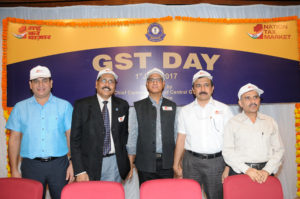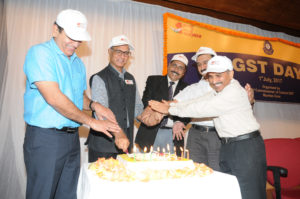by Suman Gupta

The press meet saw the presence of Chief Commissioner CGST Mumbai Zone-S.C. Varshney, Additional Commissioner CCO- S.C. Gangar, Deputy Commissioner CCO- S.K. Mishra, Commissioner Mumbai Cebtral- K.C. Gupta, Joint Commissioner Mumbai Central- Pankaj Kumar, Additional Commissioner Mumbai South- K.K. Gupta, Commissioner Mumbai East- Piyusha Patnaik
Additional Commissioner Mumbai East- Nilkhanth Shelke, Commissioner Mumbai West- Sandeep Puri
Additional Commissioner Mumbai- Manpreet Arya, Commissioner Audit 2-Suresh Krishnani
Additional Commissioner 2- A.K. Goyal, Commissioner Audit 3 – Shanbhoo Nath, Additional Commissioner- Manisha Goyal.

Ushering into Saturday, Service Tax Department & Government of India announced the arrival of the Goods and Services Tax ( GST) in India. All the dignitaries Sushil Solanki , Nihal Kothari , Shouvik Roy,Ashish Pednekar (speakers) spoke about GST, India’s biggest-ever tax reform, which will bring in place a single tax system that some analysts predict will be bigger than that of the European Union.
Service Tax Department & Government of India kicked off proceedings, delivering a short address in which they called GST an “important achievement for the entire country.” “The old India was economically fragmented, the new India will create one tax, one market and for one nation”.
Addressing the gathering, Chief Commissioner CGST Mumbai Zone-S.C. Varshney
said the introduction of GST is a moment of precedent for the country “I had always believed that GST was a matter of time and was happy when it was enacted and I gave assent to the Constitution amendment last year,” he said.
GST is expected to check tax evasion and broaden tax base. In the new regime, all filings will be done only through electronic mode to ensure non-intrusive administration. This will minimise taxpayers’ physical interaction with the tax officials.
The GST regime seeks to reduce rates of over 50 per cent of items of daily use and charge others at much lower rate of 5 per cent, 12 per cent and 18 per cent.
A higher tax rate is imposed on luxury and sin goods at 28 per cent in the new regime. Certain services like telephone, banking and insurance are expected to feel the pinch of higher taxes.
GST also promises taxpayers a refund against their sales within 60 days. Similarly, exporters will get refund within seven days. For protection of consumer rights, the new law provides anti-profiteering provisions. In a departure from the normal practice, the GST will be administered together by the Centre and the states.
Complications, however, are expected, and the general consensus is that it will take at least a month before GST’s true impact is realised.
Though even critics of the roll out agree that in the long run, GST will benefit the Indian economy.

